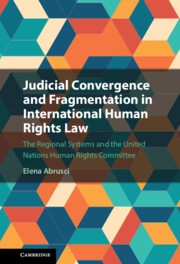 Judicial Convergence and Fragmentation in International Human Rights Law
Judicial Convergence and Fragmentation in International Human Rights Law Book contents
- Judicial Convergence and Fragmentation in International Human Rights Law
- Judicial Convergence and Fragmentation in International Human Rights Law
- Copyright page
- Contents
- Figures
- Tables
- Foreword
- Acknowledgements
- Table of Cases
- Abbreviations
- Introduction
- Part I Introducing and Assessing Fragmentation and Convergence in International Human Rights Law
- Part II Factors Explaining Judicial Convergence and Fragmentation
- 3 The Theory of Treaty Interpretation and Judicial Dialogue
- 4 The Composition of the Courts and Other Adjudicative Bodies and the Role of Their Secretariats
- 5 Calibrating Judicial Scrutiny
- 6 Deference, Subsidiarity and Regional Consensus
- 7 Outside the Courtroom
- Conclusions
- Book part
- Index
4 - The Composition of the Courts and Other Adjudicative Bodies and the Role of Their Secretariats
from Part II - Factors Explaining Judicial Convergence and Fragmentation
Published online by Cambridge University Press: 22 December 2022
- Judicial Convergence and Fragmentation in International Human Rights Law
- Judicial Convergence and Fragmentation in International Human Rights Law
- Copyright page
- Contents
- Figures
- Tables
- Foreword
- Acknowledgements
- Table of Cases
- Abbreviations
- Introduction
- Part I Introducing and Assessing Fragmentation and Convergence in International Human Rights Law
- Part II Factors Explaining Judicial Convergence and Fragmentation
- 3 The Theory of Treaty Interpretation and Judicial Dialogue
- 4 The Composition of the Courts and Other Adjudicative Bodies and the Role of Their Secretariats
- 5 Calibrating Judicial Scrutiny
- 6 Deference, Subsidiarity and Regional Consensus
- 7 Outside the Courtroom
- Conclusions
- Book part
- Index
Summary
This chapter introduces a cutting-edge study on the composition of the bodies under analysis to assess how this may influence their adjudication. An empirical quantitative study on the judges’ and commissioners’ background is combined with an analysis of their ‘judicial behaviour’ through their separate opinions. This demonstrates that judicial convergence could be partly due to the personal identity and background of those individuals called to interpret the law and adjudicate the cases. In particular, this chapter shows signs of a possible ‘Europeanisation’ of the African and Inter-American judges, which could encourage the African and Inter-American Court to converge with the European case-law. The chapter also discusses the role played by the secretariats in influencing the adjudication of human rights regional and international bodies. Drawing on interviews with members of the registries of the three regional courts, it concluded that specific agendas, priorities and internal organisations may encourage judicial convergence.
- Type
- Chapter
- Information
- Judicial Convergence and Fragmentation in International Human Rights LawThe Regional Systems and the United Nations Human Rights Committee, pp. 135 - 168Publisher: Cambridge University PressPrint publication year: 2023
